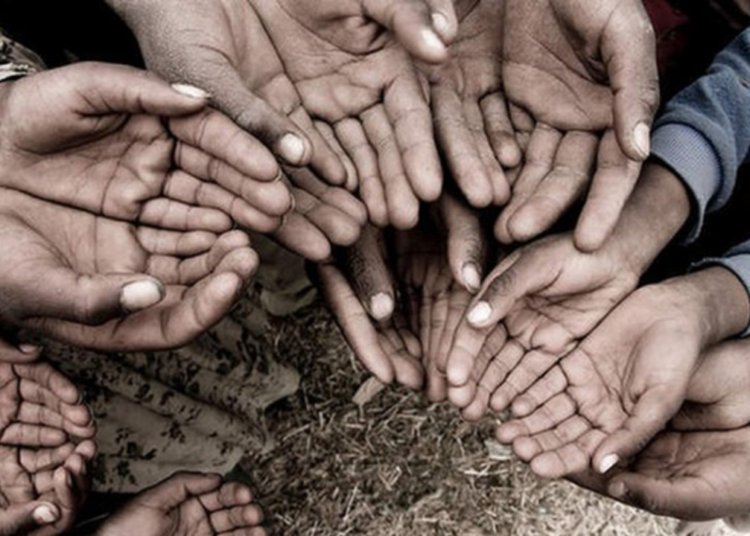In a world grappling with persistent poverty, the International Day for the Eradication of Poverty, celebrated every October 17, provides the entire humanity an opportunity to call to mind the uphill battle millions face daily.
This year’s theme brings to light the grueling realities of those trapped in extreme poverty, highlighting their relentless struggle to make ends meet.
The statistics are stark, with about 9.2 per cent of the world’s population, approximately 719 million people, living on less than $2.15 a day.
Nigeria, unfortunately, is no exception, as the National Bureau of Statistics (NBS) reported that over 133 million Nigerians, constituting about 63 per cent of the nation’s population, live in multidimensional poverty.
To put it into perspective, the number of people living in poverty exceeds the population of the United Kingdom. Maybe that was why that country’s former Prime Minister, Mrs Theresa May, had to describe Nigeria as the poverty capital of the world.
It is a circumstance to be ashamed of that out of 719 million poor people in the world, Nigeria accounts for 133 million. This is unacceptable and has to change.
In the considered opinion of this newspaper, this global issue isn’t confined to economic statistics; it’s a harrowing tale of human suffering, where many are forced to cook with dung, wood, or charcoal due to a lack of access to cleaner energy sources.
The recent removal of fuel subsidy resulting in a surge in the prices of goods and services, has further exacerbated the crisis. It’s evident that addressing poverty is not just a moral obligation but also crucial for social stability and economic growth.
As the nation commemorates this day, it’s essential to consider the steps needed to uplift the most vulnerable in the society.
We note that the Minister of Humanitarian Affairs and Poverty Alleviation, Betta Edu, has commended President Bola Tinubu for initiating conditional cash transfers to 15 million households.
She rightly points out that conditional cash transfers are effective interventions for pulling people out of poverty and providing immediate relief during economic shocks.
This approach has been proven to work globally and is a commendable step towards eradicating poverty in Nigeria.
The finance minister and Coordinating Minister of the Economy, Wale Edun, emphasized that the current situation is unacceptable, with 63 per cent of the Nigerian population living under crushing poverty.
He highlighted the government’s commitment to poverty reduction and the effectiveness of various initiatives in stabilizing the economy and enhancing productivity.
In our view, governments at all levels should brace up to the challenges of governance and tackle this head-on. What is required is the political will to take decisions that impact positively on the majority who are affected the most by the hassles of economic push and shove.
No doubt, there is a nexus between the rising insecurity in the country and extreme poverty. Tackling poverty will go a long way in reducing insecurity. This is even as security has become necessity for any meaningful economic activity to take place.
To find a ray of hope and inspiration, we can turn our eyes towards China, a nation that has made remarkable strides in eradicating poverty. That country’s experience provides valuable lessons that Nigeria can learn from in its fight against poverty.
China’s journey from poverty to prosperity wasn’t achieved overnight. It required long-term vision and commitment. It also necessitated a coordinated effort across various sectors, from government to the private sector and ultimately to civil society.
As Nigeria commemorates the International Day for the Eradication of Poverty, it’s imperative to recognize that this issue is not insurmountable.
With a coordinated effort from government, civil society, and the private sector, Nigeria can reduce poverty and provide its citizens with the opportunities they deserve.
Poverty eradication is not just a moral imperative but also a key to unlocking the nation’s full potential.
China’s success in eradicating poverty serves as a beacon of hope and inspiration for Nigeria. The path to prosperity may be challenging, but with unwavering commitment and a multi-faceted approach, it’s a path that Nigeria can navigate successfully.
It’s time for Nigeria to learn from the successes of others and chart a path towards a more prosperous, equitable, and poverty-free future.
As the country embarks on that journey, one of the lessons to learn is ability to manage resources judiciously. By implication, this entails the determination to do away with waste and corrupt influences that go with it.
Many countries have traversed this path in their development strides with brilliant tales to tell. Nigeria can and must do same if the poverty hangover must be wiped off of the nation’s psyche.





